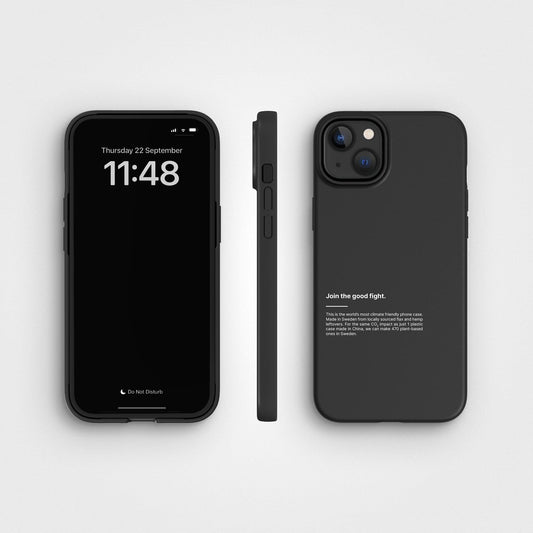Understanding plastics can be confusing. We’ve written this blog to help you understand the terminology a bit better. Here it goes…
Traditionally, industrially produced plastics have been made entirely from fossil fuels and often contain toxic materials that can leave microplastics around the world. Many types of plastic are still made this way but, in recent years, we’ve seen a lot of development towards plastics derived from different sources, many of which are renewable and without toxic ingredients.
Exploring the World of Bioplastics
This means that even if a product is made predominantly from a renewable source - such as flax, hemp, sugarcane, cornstarch - it can still be classed as a plastic. Now, to make things a little more confusing, some experts prefer to refer to these materials as bio composites, but to make things easier we’ll stick with plastics. These products are called ‘bioplastics’, either because they come from a natural source and/or because they can be classed as biodegradable (which means they are quicker to biodegrade than traditional plastics made from fossil fuels, which are far harder to break down).

In fact, ours are both - they’re predominantly plant-based and biodegradable. Bear in mind that the process of biodegrading and composting works best under the right conditions - and that requires industrial composting where the parameters can be consistent VS home composting where conditions can vary so much - depending on where you live for example. We much prefer to recycle our products by the way, but more of that later.
So, with this in mind, when we’ve used the tagline ‘no plastic’ it has been a bold marketing statement promoting the move towards bio-plastics!
Here’s where things can get a little confusing. Even though some of our phone cases are 100% biodegradable, that does not mean that they are always made 100% from renewable sources.
Examining Fossil Fuel-Based Solutions for Environmental Impact
Let’s take a look at why we might consider using materials made from fossil fuels, and what we must do to ensure they are still sustainable.
As we got to know the mobile accessory business better, we discovered that customers have some very specific needs. And that means exploring different material blends to come up with the best plastic or bioplastic to meet their needs.
Take clear cases as an example. They now make up well over half of all phone case sales but there isn’t a way to make a protective clear case only from renewable materials. So should we ignore this part of the market, or try to develop the most sustainable version we can?
Transparent Sustainability: Clear Phone Cases Redefining Eco-Friendly Protection - CLRPRTCT™
We decided that the market really deserved just that, so we spent over 2 years finding a material solution we were happy with. And now we have CLRPRTCT™, the recycled material we use in our clear cases. In this instance, we’ve actually gone for a recycled bio-plastic, derived partly from fossil fuels, partly from corn starch.
That might sound bad, but read on.
Our manufacturing partner in Sweden makes glasses and plates for schools and candy boxes for grocery stores. To make our clear phone cases, we use excess material from that production process as well as returned glasses and boxes - which means we don't have to use any new material. Better still, we can even take those phone cases back and use them to make new products. So our clear case never needs to end up in a landfill - we can recycle it again and again (up to 10 times in fact). This is a great example of taking fossil-based plastic and making it sustainable thanks to our unique circular production process.
Phone Cases with PLNTPRTCT™: Sustainable Plastic Starts with Plants
Another example is our new plant-based phone cases. The feedback from our customers was unambiguous. Make our phone case softer to the touch, more protective, and cover the buttons. Understandable, and a great challenge. Our goals were also clear. The case must remain circular and must be biodegradable. To do this we needed a softer and more elastic bioplastic, so we blended Biodegradable PBAT with our core plant-based material PLNTPRTCT™ to achieve the needed result. Biodegradable PBAT (Polybutylene Adipate Terephthalate) is the additive that makes our case softer but it is derived from fossil fuels.
Does that mean it’s less sustainable? Not in our opinion, no. For three important reasons.
As we’ve mentioned, our cases made with plants are still biodegradable, even if they contain some fossil-based materials. This is because Biodegradable PBAT, just like PLNTPRTCT™, is biodegradable - it completely decomposes without leaving any toxic residue.
Secondly, our LCA (Life Cycle Analysis) confirms that, through both material choice and manufacturing process, the CO2 emission per product stays low and to our knowledge is the lowest of any phone case available today.
Thirdly, and most importantly, it can easily be recycled so every one of our phone cases, no matter the material blend we are using, remains fully circular. Of all the choices regarding materials and ingredients, offering a circular solution is the most important choice to be sustainable.
Circular Phone Case Production - agood loop™
Our circular production process, called agood loop™, means that we can take back old phone cases, re-grind them, and use that material to make new products. It means we can take full responsibility for the end-of-life of the phone cases we make - and that’s what we are most proud of.
Now, here’s a small side benefit of using more Biodegradable PBAT in our cases. In our tests, we’ve discovered that this latest material blend is actually a star recycling performer. We’re still under testing but initial findings suggest that we can use a higher % of recycled material when making new cases, meaning less virgin material in our next generation of cases - regardless of where that material comes from.
Conclusion
An open mind to ‘plastics’ has already uncovered a number of unique sustainable solutions to the traditional phone case market. As a company, we never stand still. We’re always looking to improve and try out new materials and compositions. Perhaps one day we’ll find a renewable material good enough for a clear case. Until then, the search continues.



































